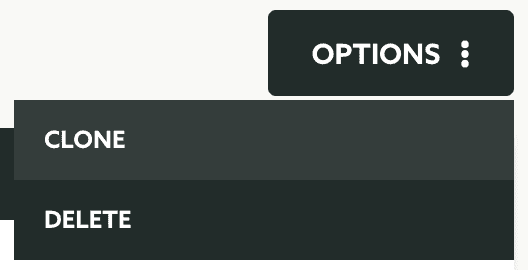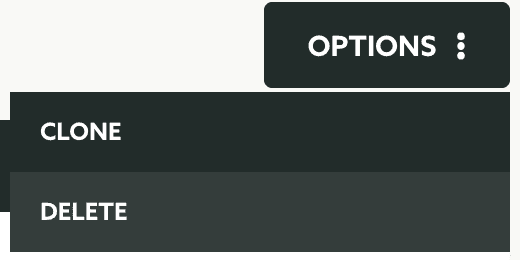Edit Automation Connectors
In this page you will learn how to edit a automation connector.
To access these pages, expand the Automation menu and click in Connectors like shown below:

From the list of Connectors click in the connector you wish to edit:

The connector wizard is divided in several sections, as shown below:

Some of these areas require mandatory input and some others don't. When a tab has a green check mark it means that the minimal configuration has been provided and it will be accepted.
Setup
Let's start with the Setup tab, in this tab you should provide a name for this connector:

That's the only required field in this tab, this will help you and your team identify this connector later on.
Frequency
You can now move on to the Frequency tab. In this tab you will be providing the how and what will trigger this connector. Let's start by providing the Frequency option:

If you want it to be triggered only one time, select the option Only once when a user:

When you select this option, you can also define in which occasion it should be triggered. This allows you to create connectors that are only triggered once on a certain occasion:

If you want this connector to be triggered every time a certain event is registered instead, go ahead and select the Every time a user option:

When you select this option, you can also define in which occasion it should be triggered. This allows you to create connectors that are triggered every time on a certain occasion:

Or if you want it to be triggered every x amount of time, select the option If a user:

When you select this option you should also provide the interval of time:

Then you should select what event will trigger this connector. Learn more about events here. Go ahead and select an event:

If you choose a custom event as your triggering event, a new option like the one below will appear:

With this option you can define if this connector should only be triggered for each distinct value of that property. Obviously, when this option is provided your custom event should contain a property with this name and have a value assigned to it. This becomes useful, if you wish to trigger one single connector for an event that can have a multitude of data values without having to create a connector for each possible value.
Optionally if want to trigger this connector only after a certain amount of time, you should provide a delay:

When you add a delay, you can also provide a cancelling event. This would allow you to cancel this connector if a certain event is registered between the period of time when it was first executed and the delay you've assigned to it:

Finally, if you would like to skip this trigger on certain days of the week, you can select the days when it should be skipped:

At this point you can already create a connector, as all mandatory tabs have been completed.
Duration
If you would like to provide a lifetime for this trigger, you can set it in the Duration tab. In this tab you can provide the start and end date for this connector by providing a date in Between and And fields:

You can also provide a start and end time. A connector will not be executed outside of that time period:

Please note that dates and times provide in these fields will respect the device's timezone.
Filters
Optionally you can also assign filters to your connector. Through an advanced criteria, you are able to select certain group of users or devices that are eligible for a connector, ignoring all the rest. Go ahead and click the Filters tab to set this up:

Learn more about how to setup a criteria in our guides located here.
If you've assigned a custom event to this connector, optionally you can change existing data filters or define new ones. This will allow you to execute connectors based on the custom data included in those events:

Learn more about how to create data filters in our guides located here.
Segmentation
It is also possible to automatically categorize users as these connector get executed. This is extremely powerful if you want to categorize users based on their behaviour without having to necessarily include this functionality in your apps. To add segmentation rules, go ahead an open the Segmentation tab:

Learn more about how to setup segmentation rules in our guides located here.
Content
Finally in this tab you can jump directly to editing the content set for this connector. By default this will set to None and the user will not see anything as these connectors occur. If instead you have selected to send a Push Message it will show something like this:

Clicking on it will take you to a message editor. Learn more about editing push messages please read our guides here.
If instead you have selected to send a Email Message it will show something like this:

Clicking on it will take you to a message editor. Learn more about editing email messages please read our guides here.
If instead you have selected to send a SMS Message it will show something like this:

Clicking on it will take you to a message editor. Learn more about editing SMS messages please read our guides here.
If you made changes to your connector, before jumping to the content editor, make sure you click the Save button to store these changes:

In the top right corner of this page, you'll find the Options menu, from this menu you can clone a particular automation connector:

Or eventually delete an automation connector:
